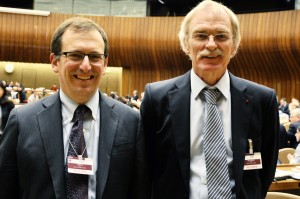
The rapid pace of advances in the life sciences mean they must continually be evaluated and assessed to ensure appropriate oversight is in place. One area of life science research that has gained a great deal of attention recently is ‘gain-of-function’ research, which makes certain viruses more transmissible or deadly. This seminar, held on the margins of the Biological Weapons Convention Meeting of States Parties on 1 December 2014 at the Palais des Nations, Geneva, considered the science and risks of gain-of-function research.
 Prof Simon Wain-Hobson of the Pasteur Institute and Prof Marc Lipsitch of the Harvard School of Public Health gave presentations on how the international community can: (1) identify the risks of gain-of-function work; and (2) develop appropriate oversight mechanisms. A podcast of their presentations is available above.
Prof Simon Wain-Hobson of the Pasteur Institute and Prof Marc Lipsitch of the Harvard School of Public Health gave presentations on how the international community can: (1) identify the risks of gain-of-function work; and (2) develop appropriate oversight mechanisms. A podcast of their presentations is available above.
Biological Weapons Convention member states were encouraged to endorse the 17 October 2014 US moratorium on gain-of-function research and to carry out comprehensive risk assessments to quantify the risks of release of gain-of-function viruses into the community in terms of loss of human life, costs to health care systems, financial and socio-economic costs, and liability costs. States pursuing gain-of-function research have an extra responsibility. They must ensure their national arrangements for gain-of-function oversight take its implications for the Convention fully into account and document their oversight arrangements in the annual CBM returns on Form E. Any gain-of-function work carried out as part of national biodefence R&D should be specifically identified and outlined in CBM Form A. CBM declarations on gain-of-function will signal a commitment to responsible innovation and promote confidence in others that appropriate oversight mechanisms are in place.